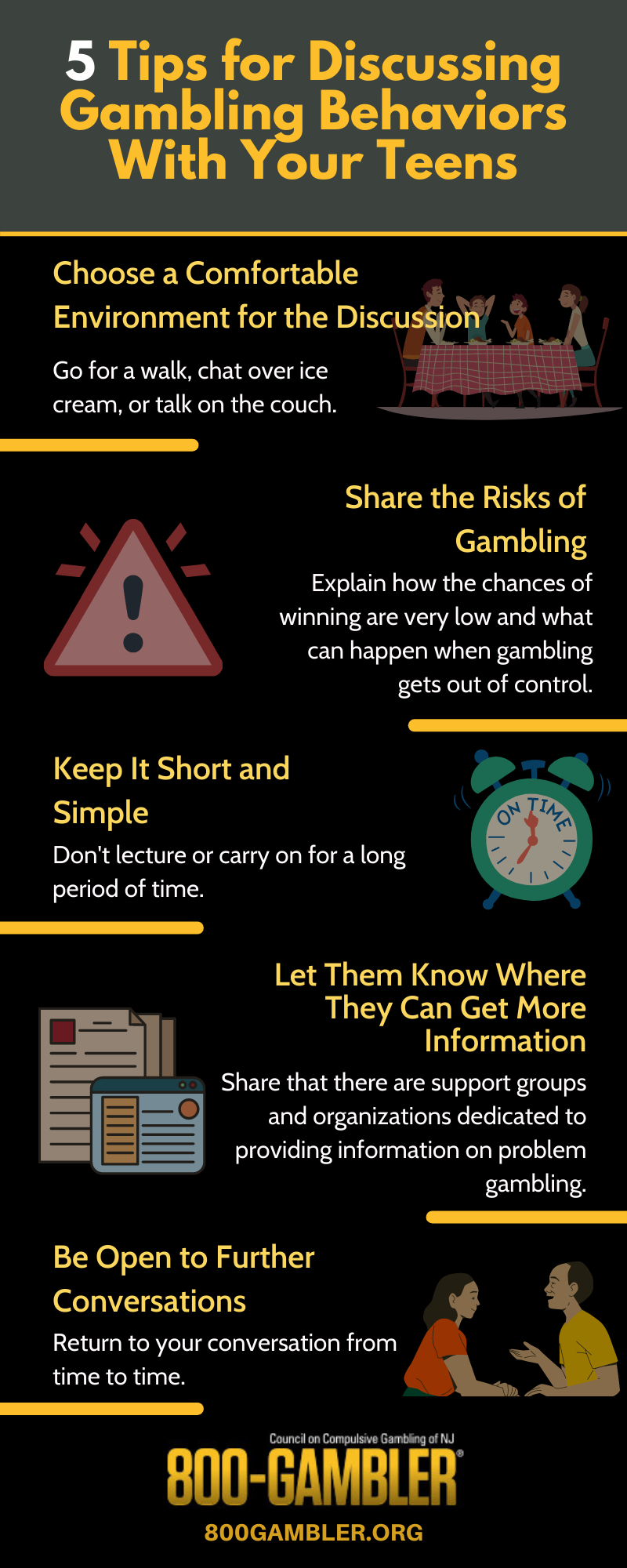For many parents, the idea of discussing gambling behaviors with their children has not even crossed their minds. Unfortunately, this leaves teenagers and kids vulnerable to developing a gambling disorder as they get older because they were never taught how to have a healthy relationship with gambling.
Whether your child is five or fifteen, now is a good time to start having open discussions with your children about gambling. Here’s why it’s important to talk about gambling habits with your child and how you can have a good conversation.
Should You Be Concerned About Your Child Gambling?
It’s easy to think that you don’t have to worry about your underage child engaging in gambling behaviors since it’s illegal for minors to gamble. However, kids are already participating in gambling activities. Teenagers may bet on sports games or card games at lunch. They may also purchase loot boxes in their video games. Younger kids often play games with elements of chance, encouraging them to take minor risks for small prizes. No one is completely immune to the draw of taking a risk to win big.
Games of chance, whether or not they involve the exchange of money, encourage kids to spend all their time trying to achieve a win. A feel-good hormone called dopamine is released in their brains whenever they get a win. When a child’s dopamine levels are frequently affected by gambling behaviors at a young age, they will grow up having little to no interest in simple activities. They will always chase that adrenaline rush they felt when participating in gambling activities.
Another reason you should consider talking about gambling with your kids is that people who place bets at a young age are more likely to develop gambling problems as they age. They may also experience more severe medical and psychiatric complications than those who started gambling at a later age.
It’s also important to note that kids and young people who gamble, especially online, experience lower self-esteem than their peers. They are also likely to consume more alcohol. By freely discussing gambling and its potential consequences with your children, you reduce their chances of developing a gambling disorder. But how exactly do you have this important conversation?
5 Tips for Talking About Gambling With Your Kids
Help your kids develop a healthy relationship with gambling by talking about it with them. Here are five strategies for ensuring the discussion goes smoothly:

Start the Conversation at the Right Time
The best time to initiate a conversation about gambling is when everyone is in a good mood. You should try to keep it as casual as possible. Start the conversation over scoops of ice cream, while taking a road trip, or at the dinner table.
Highlight the Risks
Make sure you let your kids know that gambling is risky and chances of winning are very low. Now would also be a good time to go over the warning signs of a gambling problem, so they will know how to regulate their behavior if they decide to gamble when they are legal.
If you had a loved one whose gambling had a negative impact, you can share how their gambling problem affected your family. This will make your points more concrete. Be careful to avoid sweeping statements or threats. You want to communicate your values clearly, but you don’t want to scare your kids or unwittingly encourage them to rebel.
Keep the Discussion Short
Your child’s attention span is only so long, and your teen will be tempted to tune you out if your message sounds like a lecture. Keep the discussion short, and if you don’t have a chance to say everything you want, save it for a later date.
Offer Them Additional Resources
Often, when teens are struggling with something, they do not want to talk about their problems with their family members. So, as you bring the conversation to an end, let your children know where they can get more information or help. Remind them that there are support groups available and that they can get more resources on problem gambling from the Council on Compulsive Gambling of New Jersey.
Keep Lines of Communication Open
Before having everyone return to their normal activities, make sure you let your kids know that you are open to answering any questions they may have. It will also be a good idea to ask your children from time to time which games they are playing on their computers and phones. Many young people have reported that a lack of communication allowed their gambling behaviors to go undetected by their parents.
Need Help?
If you’re concerned your child may be gambling, you can call 1-800-GAMBLER for guidance. We offer help for problem gamblers 24/7 and can connect you with programs, groups, and resources to help your loved one experience a brighter future. Contact us today!



